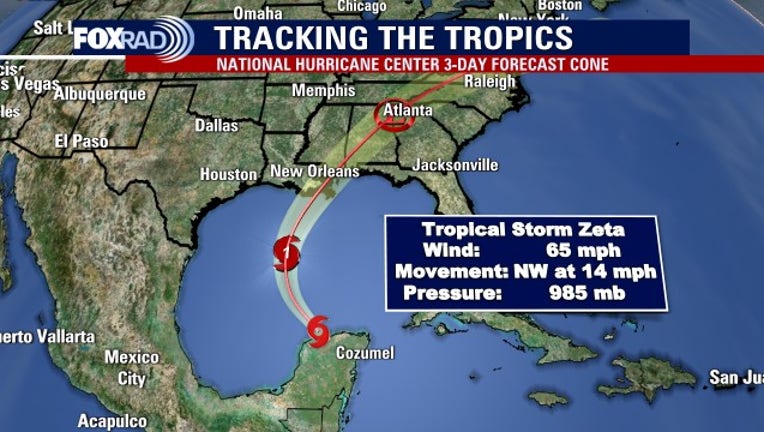Hurricane warning for New Orleans as Zeta swirls over Mexico

Texas is not in Zeta's cone of uncertainty. Zeta will pass well east of the Houston area late Wednesday with the only effect here being waves and minor coastal flooding on Wednesday.
NEW ORLEANS - Residents of the storm-pummeled Gulf Coast steeled themselves for yet another tropical weather strike Tuesday after Zeta raked across the Yucatan Peninsula on a track that forecasters said would likely bring it ashore south of New Orleans as a hurricane.
Tropical Storm Zeta, the 27th named storm of a very busy Atlantic hurricane season, headed for a Wednesday evening landfall and was expected to bring another round of high water and strong wind to a state that already this year has been hit by two tropical storms and two hurricanes: Laura, blamed for at least 27 Louisiana deaths after it struck in August, and Delta, which exacerbated Laura’s damage in the same area weeks later.
This time, Zeta — with 65 mph (100 kph) winds and centered 520 miles (835 kilometers) south of the mouth of the Mississippi River — was on a track for southeast Louisiana. Its approach frayed nerves in New Orleans, where thousands of evacuees left homeless by Laura are sheltered in hotels.
“It really is scary, and I don’t know what to do,” said Yolanda Lockett, who evacuated her Lake Charles apartment — now a rain-soaked, moldy mess — ahead of Laura at the end of August. “I’m physically and mentally tired,” she said, standing outside a New Orleans hotel.
Hurricane warnings went up from the central Louisiana coast to the Alabama state line. Louisiana Gov. John Bel Edwards declared an emergency ahead of the storm. And commercial fishermen, again, had to stop fishing, stop marketing their catch and pull in their boats.
SIGN UP FOR FOX 26 HOUSTON EMAIL ALERTS
“The sad thing about is, the industry shuts down for a week, a week and a half with this stuff every time it happens,” said Acy Cooper, a shrimper in Plaquemines Parish at Louisiana’s southeastern tip. “It’s just killing our fishing man. Killing us.”
It wasn’t just Louisiana. On Dauphin Island, located off the Alabama coast south of Mobile, workers at Dauphin Island Marina prepared for Zeta on Tuesday even though little remained of the business to protect after it was pummeled by Sally in September. Pilings with no decking rise from the water and a few boats that sunk during that hurricane are still on the bottom.
“Right now we’re packing stuff up just to be safe. They’re saying it’s only supposed to be a Cat 1, but who knows,” said marina employee Jess Dwaileebe. “We don’t have any docks or fuel pumps at this point. Sally took it all out.”
In Waveland, Mississippi, hardware store operator David Hubbard said a few people were moving boats out of the town harbor but he’d yet to see a rush of people buying plywood, generators or other storm supplies. Most people already have what they need because Zeta is only the latest threat in a busy hurricane season, he said.

Strong winds lash Mexico as Hurricane Zeta approaches
Hurricane Zeta hit Mexico on October 26, bringing maximum sustained winds of 80 miles per hour, according to the National Oceanic and Atmospheric Association. Footage shows strong winds in Cancún, on the Yucatán Peninsula. Credit: Lisa Hwang via Storyful
Zeta made landfall in Mexico on Monday as a hurricane just north of the ancient Mayan city of Tulum with maximum sustained winds of 80 mph (130 kph). It weakened to a tropical storm as it crossed over land, but it was expected to regain strength over the Gulf of Mexico.
Zeta broke the record for the previous earliest 27th Atlantic named storm that formed Nov. 29, 2005. It’s also the 11th hurricane of the season. An average season sees six hurricanes and 12 named storms.
There have been so many storms this season that the hurricane center had to turn to the Greek alphabet after running out of assigned names.
The extraordinarily busy hurricane season has focused attention on the role of climate change, which scientists say is causing wetter, stronger and more destructive storms.

Hurricane Zeta brings strong winds to Mexico
Footage shows strong winds lashing the coast of Cozumel. Credit: Alberto Capella via Storyful
MORE TROPICAL WEATHER UPDATES FROM FOX 26
Zeta is just the latest in a series of troubles for fishermen like Peter Gerica. He works in the Lake Pontchartrain area and has also had to deal with silt and pollution in the lake — a byproduct of the opening of a spillway to deal with dangerously high water on the Mississippi River earlier in the year. And, he said, there is also a depressed seafood market because of the coronavirus pandemic.
“When you have acts of nature that come along, and it loses time for you, you can’t make it up,” says Gerica. “It’s lost.”
_
Associated Press reporter Jay Reeves, in Birmingham, Alabama, contributed to this story.

